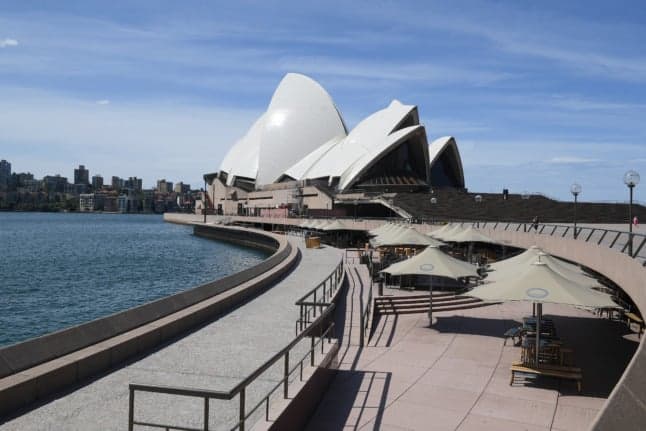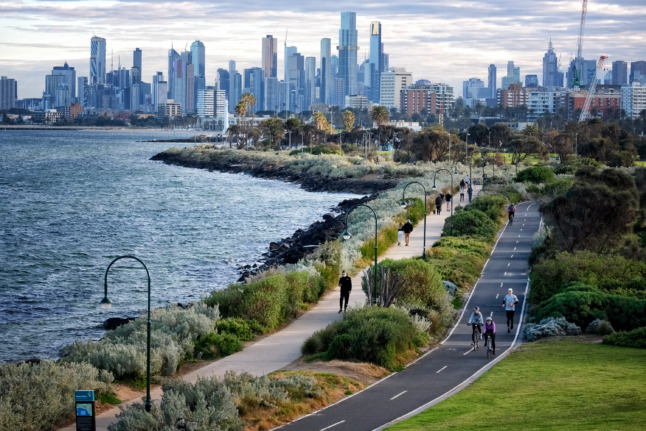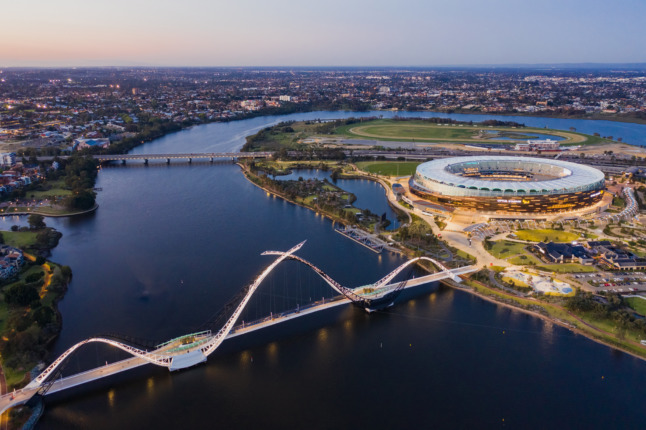Australia poised to open borders to vaccinated German travellers after two-year hiatus

After almost two years of strict Covid entry controls for both citizens and tourists, vaccinated people in Germany will finally be allowed to enter many parts of Australia from February 21st.
The move will see the country reopen to vaccinated international tourists, businesspeople and other visa-holders living abroad who have been unable to enter Australia since March 2020.
Announcing the upcoming change in early February, Australian Home Affairs Minister Karen Andrews said the relaxation of border controls for vaccinated people was "protecting the health of Australians, but at the same time working towards our economic recovery here".
From February 21st, non-citizens and non-residents will no longer need an exemption to visit the country, though they will have to show proof of double-vaccination or a medical exemption.
International travel ban
In the wake of the Covid-19 pandemic, Australia implemented some of the strictest border controls in the world that saw international travel banned in both directions for people without exemptions.
The rules meant that some Australians who had planned to move or travel abroad were stranded in the country for several months until the rules were changed to allow citizens to leave - provided they were fully vaccinated - on November 1st.
READ ALSO: How non-EU nationals can get a residency permit to live in Germany
Though Australians living abroad in Germany were technically allowed to enter the country before this date, thousands struggled to go home for weddings, funerals and visits to friends and family as they were forced to navigate strict entry quotas and expensive quarantine arrangements.
Hannah Turner from Adelaide, who lives in Berlin, was unable to travel home for her sister's wedding and her father's death and funeral last year.
She said she would have been willing to quarantine at her family's house and take as many tests as required, but that she couldn't afford the exorbitant flights and hotel quarantine and risk not being able to return to Germany.
From November 1st, the rules changed to allow quarantine-free travel for vaccinated citizens in the majority of states, though inbound flights from international destinations remained limited.
But even as the rules began to be relaxed, Hannah said she felt "numb".
"The fact that Covid is barrelling through the Australian public means my sacrifice, and the sacrifices of thousands of others was all for naught," she told The Local.
"The affect that this has had on my mental health has been astounding, and I suppose I’m still just taking it one day at a time."
Entry for tourists
In one of the first phases of the reopening in October last year, permanent residents and immediate family members of Australians were able to apply for an exemption to go to Australia.
In December 15th, a further change allowed a small number of international students and skilled foreign workers into the country.
When the borders reopen on February 21st, however, it will be the first time that an unrestricted number of non-citizens will be allowed to enter the country for tourist visits, business trips, studies or employment, provided they are fully vaccinated.
Entry for tourists had originally been touted to happen in late last year as part of a phased reopening but was then postponed by several weeks.
The change marks a shift in strategy away from aiming to wipe out Covid infections (a policy known as 'zero Covid') to placing an emphasis on vaccination.

The skyline of Melbourne, Australia. Melbourne is a popular destination for international travellers and migrants. Photo: picture alliance/dpa/AAP | Luis Ascui
READ ALSO: Australia could open to German tourists ‘by Christmas’, says minister
Australian Prime Minister Scott Morrison said the move was the logical "next step" in the gradual reopening of the borders.
"It's a sensible and, I think, very important move for us to make as we drive Australia back to a position of as much normality as we can achieve," he told reporters in February.
Individual states will be permitted to enforce their own entry rules, which may be stricter than the federal rules, but so far the vast majority of states have opted to allow quarantine-free travel for the vaccinated.
Western Australia to reopen later
A notable exception is the state of Western Australia, which remained closed off from the rest of the country even after the reopening to citizens on November 1st.
To protect its zero-Covid status, the Western Australian government has continued to keep tough restrictions in place, effectively barring many travellers from other Australian states and international travellers without an exemption.
Those who were allowed to enter were subject to strict quarantine rules.
Jason Wingrove, 29, from Perth in Western Australia, said he was initially "very impressed" with the state's response to the pandemic, which allowed his friends and family to stay safe and live a normal life.
However, the Berlin resident said he became "increasingly frustrated" at the lack of a plan for allowing citizens and international travellers back into the country after almost two years - a delay that caused him to miss the wedding of one his closest friends.

A view of Perth, Western Australia. Photo: picture alliance/dpa/Tourism Western Australia | Jarrad Seng
"It was clear that Western Australia couldn't simply remain cut off from the rest of the world indefinitely and just wait for the virus to disappear but delay after delay meant that many West Australians like myself have been separated from their families for more than three years now," he told The Local.
"Although I very much understand the need to protect the healthcare system and prioritise the health and safety of the population, I don't think 'sitting back and waiting for this whole thing to blow over' is a very good approach during a global pandemic."
According to a government statement made on Friday, the state will reopen to international travellers later than other parts of Australia on March 3rd and will require incoming arrivals to be double-vaccinated and also take a negative test within 12 hours of landing.
Unvaccinated citizens will also be allowed to return but will have to complete a 14-day hotel quarantine.
Those arriving from other parts of Australia, meanwhile, will require a booster jab.
The Local contacted the Australian Embassy in Berlin for comment but did not receive a response.
Comments
See Also
The move will see the country reopen to vaccinated international tourists, businesspeople and other visa-holders living abroad who have been unable to enter Australia since March 2020.
Announcing the upcoming change in early February, Australian Home Affairs Minister Karen Andrews said the relaxation of border controls for vaccinated people was "protecting the health of Australians, but at the same time working towards our economic recovery here".
From February 21st, non-citizens and non-residents will no longer need an exemption to visit the country, though they will have to show proof of double-vaccination or a medical exemption.
International travel ban
In the wake of the Covid-19 pandemic, Australia implemented some of the strictest border controls in the world that saw international travel banned in both directions for people without exemptions.
The rules meant that some Australians who had planned to move or travel abroad were stranded in the country for several months until the rules were changed to allow citizens to leave - provided they were fully vaccinated - on November 1st.
READ ALSO: How non-EU nationals can get a residency permit to live in Germany
Though Australians living abroad in Germany were technically allowed to enter the country before this date, thousands struggled to go home for weddings, funerals and visits to friends and family as they were forced to navigate strict entry quotas and expensive quarantine arrangements.
Hannah Turner from Adelaide, who lives in Berlin, was unable to travel home for her sister's wedding and her father's death and funeral last year.
She said she would have been willing to quarantine at her family's house and take as many tests as required, but that she couldn't afford the exorbitant flights and hotel quarantine and risk not being able to return to Germany.
From November 1st, the rules changed to allow quarantine-free travel for vaccinated citizens in the majority of states, though inbound flights from international destinations remained limited.
But even as the rules began to be relaxed, Hannah said she felt "numb".
"The fact that Covid is barrelling through the Australian public means my sacrifice, and the sacrifices of thousands of others was all for naught," she told The Local.
"The affect that this has had on my mental health has been astounding, and I suppose I’m still just taking it one day at a time."
Entry for tourists
In one of the first phases of the reopening in October last year, permanent residents and immediate family members of Australians were able to apply for an exemption to go to Australia.
In December 15th, a further change allowed a small number of international students and skilled foreign workers into the country.
When the borders reopen on February 21st, however, it will be the first time that an unrestricted number of non-citizens will be allowed to enter the country for tourist visits, business trips, studies or employment, provided they are fully vaccinated.
Entry for tourists had originally been touted to happen in late last year as part of a phased reopening but was then postponed by several weeks.
The change marks a shift in strategy away from aiming to wipe out Covid infections (a policy known as 'zero Covid') to placing an emphasis on vaccination.

READ ALSO: Australia could open to German tourists ‘by Christmas’, says minister
Australian Prime Minister Scott Morrison said the move was the logical "next step" in the gradual reopening of the borders.
"It's a sensible and, I think, very important move for us to make as we drive Australia back to a position of as much normality as we can achieve," he told reporters in February.
Individual states will be permitted to enforce their own entry rules, which may be stricter than the federal rules, but so far the vast majority of states have opted to allow quarantine-free travel for the vaccinated.
Western Australia to reopen later
A notable exception is the state of Western Australia, which remained closed off from the rest of the country even after the reopening to citizens on November 1st.
To protect its zero-Covid status, the Western Australian government has continued to keep tough restrictions in place, effectively barring many travellers from other Australian states and international travellers without an exemption.
Those who were allowed to enter were subject to strict quarantine rules.
Jason Wingrove, 29, from Perth in Western Australia, said he was initially "very impressed" with the state's response to the pandemic, which allowed his friends and family to stay safe and live a normal life.
However, the Berlin resident said he became "increasingly frustrated" at the lack of a plan for allowing citizens and international travellers back into the country after almost two years - a delay that caused him to miss the wedding of one his closest friends.

"It was clear that Western Australia couldn't simply remain cut off from the rest of the world indefinitely and just wait for the virus to disappear but delay after delay meant that many West Australians like myself have been separated from their families for more than three years now," he told The Local.
"Although I very much understand the need to protect the healthcare system and prioritise the health and safety of the population, I don't think 'sitting back and waiting for this whole thing to blow over' is a very good approach during a global pandemic."
According to a government statement made on Friday, the state will reopen to international travellers later than other parts of Australia on March 3rd and will require incoming arrivals to be double-vaccinated and also take a negative test within 12 hours of landing.
Unvaccinated citizens will also be allowed to return but will have to complete a 14-day hotel quarantine.
Those arriving from other parts of Australia, meanwhile, will require a booster jab.
The Local contacted the Australian Embassy in Berlin for comment but did not receive a response.
Join the conversation in our comments section below. Share your own views and experience and if you have a question or suggestion for our journalists then email us at [email protected].
Please keep comments civil, constructive and on topic – and make sure to read our terms of use before getting involved.
Please log in here to leave a comment.